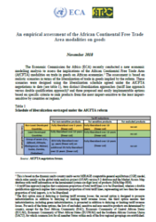An empirical assessment of the African Continental Free Trade Area modalities on goods

The Economic Commission for Africa (ECA) recently conducted a new economic modelling analysis to assess the implications of the African Continental Free Trade Area (AfCFTA) modalities on trade in goods on African economies.1 The assessment is based on realistic scenarios in terms of the liberalization of trade in goods implied by the reform. These scenarios were designed using the liberalization schedule agreed under the AfCFTA negotiations to date (see table 1), two distinct liberalization approaches (tariff line approach versus double qualification approach)2 and three proposed and easily implementable options based on specific criteria to rank products from the most import-sensitive to the least import-sensitive by countries or regions.